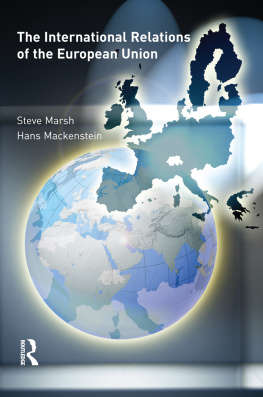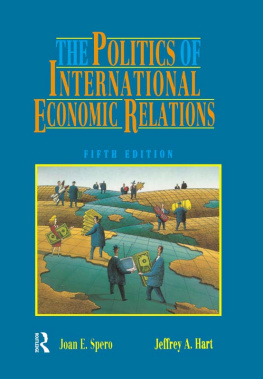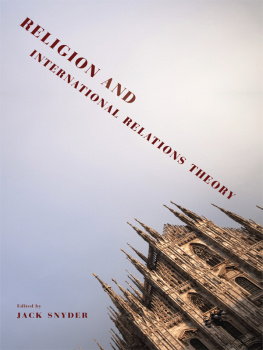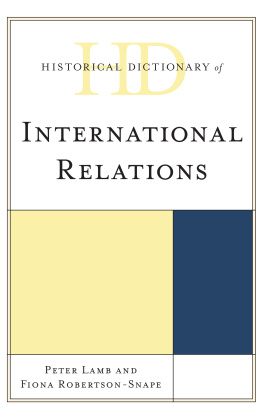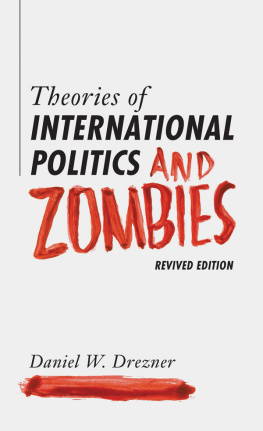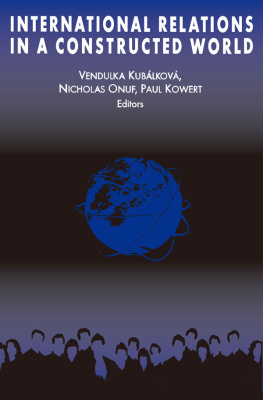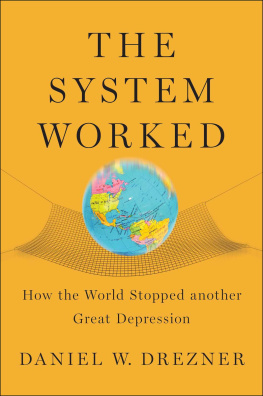THEORIES OF
INTERNATIONAL
POLITICS
AND ZOMBIES
DANIEL W. DREZNER
PRINCETON UNIVERSITY PRESS
PRINCETON AND OXFORD
Copyright 2011 by Princeton University Press
Published by Princeton University Press, 41 William Street,
Princeton, New Jersey 08540
In the United Kingdom: Princeton University Press, 6 Oxford Street,
Woodstock, Oxfordshire OX20 1TW
press.princeton.edu
All Rights Reserved
Library of Congress Cataloging-in-Publication Data
Drezner, Daniel W.
Theories of international politics and zombies / Daniel W Drezner.
p. cm.
Includes bibliographical references and index.
ISBN 978-0-691-14783-3 (pbk : alk. paper) 1. International relationsPhilosophy. 2. Zombie filmsHistory and criticism. I. Title.
JZ1305.D74 2011
327.101dc22
2010034287
British Library Cataloging-in-Publication Data is available
This book has been composed in Janson Text
Printed on acid-free paper.
Printed in the United States of America
10 9 8 7 6 5 4 3 2 1
For my son Sam, who thought this was
way cooler than my other books;
and my daughter Lauren, for reassuring me
that there are no zombies in this land.
CONTENTS
Domestic Politics:
Are All Zombie Politics Local?
Bureaucratic Politics:
The Pulling and Hauling of Zombies
We're Only Human:
Psychological Responses to the Undead
PREFACE
Fifteen years ago, on a cross-country drive, I stopped to visit Graceland. By the time my tour hit the Jungle Room, it was obvious that the thirty-odd people walking through Elvis Presley's mansion fell into two groups. The first contingent was thoroughly, utterly sincere in their devotion to all things Elvis. They were hardcore fans, and Graceland was their Mecca, their Jerusalem, and their Rome. Many of them sounded convinced that the King was still walking the earth. They gasped when they saw the jumpsuit collection, bedazzled by its grandeur.
The second group of tourists was equally delighted to be at Graceland, but for a different reason. These people took great pleasure in the kitschy nature of all things Elvis. To them, a mansion that preserved the aesthetics of green shag carpeting and mirrored walls was both funny and tacky. They gasped when they say the jumpsuit collection, bedazzled by how ridiculous they thought it was.
As we ambled along, the sheer professionalism of our tour guide struck me. Her task was not an easy one. She had to provide a veritable font of Elvis knowledge to all of the intense devotees. At the same time, she also had to acknowledge the absurdist nature of the experience for of the rest of the tour group.
With subtle changes in her facial expressions and slight adjustments in her tone of voice, our guide accomplished her task brilliantly. At no point in time did she diminish Elvis in the eyes of his devout followers. Still, I believe everyone left Graceland that day thoroughly satisfied with their visit.
Think of this book as my tour of a different kind of Graceland, only with a lot more footnotes. Oh, and zombies.
Thus said the Lord God unto these bones:
Behold, I will cause breath to enter into you,
and ye shall live. And I will lay sinews upon
you, and bring up flesh upon you, and cover
you with skin, and put breath in you, and ye
shall live; and ye shall know that I am the Lord.
So I prophesized as I was commanded; and as
I prophesized, there was a noise, and behold a
commotion, and the bones came together, bone to
its bone. And I beheld, and, lo, there were sinews
upon them, and flesh came up, and skin covered
them above; but there was no breath in them.
EZEKIEL 37:5-8
INTRODUCTION
TO THE UNDEAD
There are many natural sources of fear in world politicsterrorist attacks, lethal pandemics, natural disasters, climate change, financial panic, nuclear proliferation, ethnic conflict, global cyberwarfare, and so forth. Surveying the cultural zeitgeist, however, it is striking how an unnatural problem has become one of the fastest-growing concerns in international relations. I speak, of course, of zombies.
Whether they are called ghouls, deadites, post-humans, stenches, deadheads, the mobile deceased, or the differently animated, the specter of the living dead represents an important puzzle to scholars of international relations and the theories we use to understand the world. What would different theories of international politics predict would happen if the dead began to rise from the grave and feast upon the living? How validor how rottenare these predictions?
Serious readers might dismiss these questions as fanciful, but concerns about flesh-eating ghouls are manifestly evident in popular culture. Whether one looks at films, songs, games, or books, the genre is clearly on the rise. As

Figure 1. Popular and scholarly interest in zombies.
Sources: Wikipedia, Web of Science.

Figure 2. Interest in zombies since 2000.
Sources: Amazon.com, Wikipedia.
Nor is this interest limited to celluloid. A series of zombie video games, including the Resident Evil and Left 4 Dead franchises, was the precursor for the renaissance of zombie cinema. The undead are now on television shows, such as Comedy Central's Ugly Americans and AMC's The Walking Dead . Over the past decade, zombies have also seeped onto the written page. The popular literature ranges from how-to survival manuals,). Clearly, the living dead have lurched from marginal to mainstream.

Figure 3. Media mentions of zombies. Source: Lexis-Nexis
One could dismiss the zombie trend as merely feeding a mass public that craves the strange and bizarre. Such an explanation would be only skin-deep. Popular culture often provides a window into the subliminal or unstated fears of citizens, and zombies are no exception. Some cultural commentators argue that the September 11, 2001, terrorist attacks are a primary cause for renewed interest in the living dead, and the numbers appear to back up this assertion (see
Some international relations scholars would posit that interest in zombies is an indirect attempt to get a cognitive grip on what former U.S. secretary of defense Donald Rumsfeld famously referred to as the unknown unknowns in international security. No great power has done the same in publicbut one can only speculate what these governments are doing in private.
One must be wary of overstating the caseafter all, flesh-eating ghouls are not the only paranormal phenomenon to spark popular interest. Over the past decade, aliens, ghosts, vampires, wizards, witches, and hobbits were also on the tip of everyone's tongue. For some, the specter of zombies pales in comparison to other paranormal creatures. The disdain of cultural elites has abetted this perspective by placing zombies in the derivative, low rent part of the paranormal spectruma shuffling, stumbling creature that desires only braaaaiiiiiinnnnnnns. Twenty-five years ago, James Twitchell concluded, the zombie is an utter cretin, a vampire with a lobotomy. In 2010, the Academy Awards presented a three-minute homage to horror cinema, and only a millisecond was devoted to any zombie filmfar less than that Chucky doll. No zombie has the appeal of J. K. Rowling's Harry Potter or the Twilight series' Edward Cullen.

Next page


